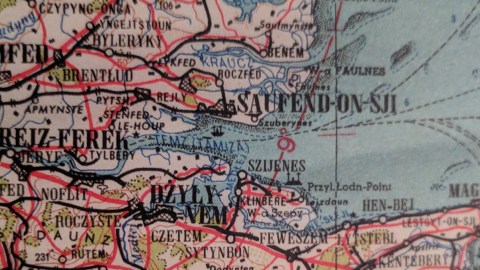Greetings from Saufend-on-Sji, in Polish-occupied England

This is England. But not as we know it. Imagine an alternative past, in which the Warsaw Pact successfully invaded Great Britain.
A Polish occupying force is trying to make sense of this strange land, and the strange names of its cities and towns. How would a Polish soldier have asked a local for directions? Not by trying to read Southend-on-Sea off a map. That name trips off a Warsaw tongue much easier in Polish phonetic spelling: Saufend-on-Sji.
This map was produced by and for the army of communist Poland, in our past – the real one – for the aftermath of a military victory that never materialised.
If the time had ever come for the Polish Army to police this corner of England, a map like this would have been handy, rendering the names of the main towns and cities of the area in a phonetic spelling that makes Polish sense out of English topography. Some other examples:
- Dzylynem is Gillingham
- Roczyste is Rochester
- Mejdsten is Maidstone
- Tanbrydz-Łelz is Tunbridge Wells
- Hejstynz is Hastings
- Istbon is Eastbourne
- Koulczyste is Colchester
- Byszeps-Stofed is Bishops Storford
- Apmynste is Upminster
- and of course, Landen is London.

Britain’s island geography has protected it from the invasions that have plagued its European neighbours, stuck together on the European mainland like ferrets fighting in a sack. William the Conqueror was the last European warlord to successfully invade England, and that’s almost a thousand years ago (stick around for the millennial commemoration in 2066).
The Napoleonic wars led to an outbreak of invasion hysteria, as did Britain’s solo confrontation of Nazi Germany at the start of World War II. It is the latter trauma that retrospectively resonates in popular fiction, such as It Happened Here, a film from 1964; and the SS-GB a novel by Len Deighton from 1978, made into a tv series in 2017.
Invasion and occupation by the Soviets and their allies didn’t figure much in the public imagination – if the Cold War turned hot, the expected outcome was nuclear armageddon, not the hammer-and-sickle flag flying over Whitehall.
Nevertheless, it appears the Warsaw Pact planned for just such an outcome. Since the fall of communism, a plethora of military maps of western cities (both in Europe and the U.S.) have been released to the public. Virtually all these were in Russian, i.e. in cyrillic script. Yet it’s somehow weirder to see the stolid names of Home County cities and towns mutated into another tongue using the same latin script as English.
If the Occupation had taken hold, could Chatham over time have changed into Czetem? Margate into Magyt? Canterbury into Kentebery? Perhaps. But only if the occupiers would have gotten wind of the fact that those stubborn locals, when asked to show the way to Saufend-on-Sji, would routinely point to Czelmsfed (Chelmsford) instead.
Image found here on the Twitter feed of Alex White.
Strange Maps #865.
Got a strange map? Let me know atstrangemaps@gmail.com.





